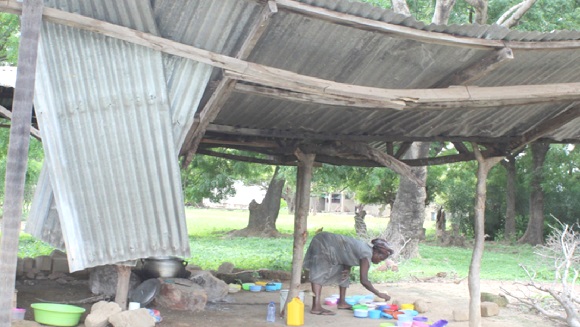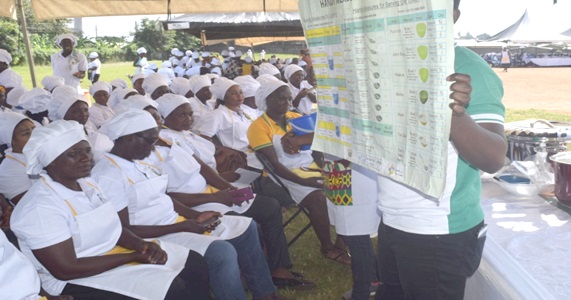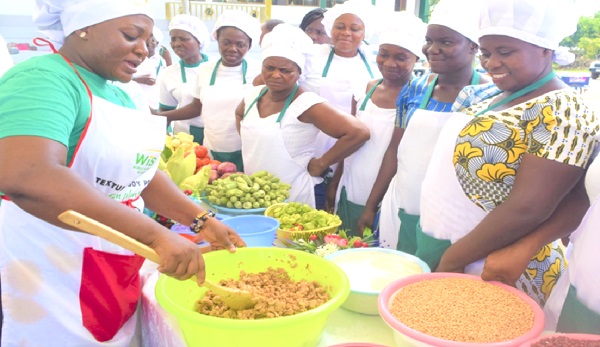
Ghana School Feeding Programme, impact on child nutrition
Education is a basic human right. This is supported by Article 46 of the UN Universal Declaration in 1948 which indicates that education at the elementary level should be free.
Based on this, everyone is entitled to education regardless of socio-economic status, gender, race, etc. However, one factor that hinders the achievement of a child’s full educational potential at the basic level in developing countries is hunger and malnutrition due to poverty.
Advertisement
The School Feeding programme (SFP) constitutes the provision of prepared and served meals in schools with the aim of increasing enrolment, preventing starvation and improving nutrition.

In Ghana, SFP was initiated by the Catholic Relief Services (CRS) in 1952 as part of its humanitarian services with focus on the northern parts of the country where poverty levels are high. The main objective was to support the achievement of the UN Universal Declaration on education. This initiative led to improved school enrolment and reduced burden on food-insecure families.
In 2005, the Government of Ghana initiated the Ghana School Feeding Programme (GSFP) as a national policy in the context of the Comprehensive African Agricultural Development Goals (CAADP). The aim was to increase school enrolment and improve retention. To achieve additional objectives, a component known as “home-grown school feeding programme” was added to make the programme sustainable.
Nutritional impact of GSFP
A number of the studies that evaluated the impact of GSFP on the nutritional status of schoolchildren reported varying results. While some studies reported improved nutritional status for pupils who benefited from the GSFP compared to those who did not, other studies reported no significant differences.
Tette and Enos (2020) observed that while under-nutrition and anaemia remained prevalent in several schools with and without the GSFP, there was evidence that the GSFP offered protection from hunger for some children and had a greater effect on the nutritional status of children from poorer communities.
A study to evaluate the impact of the GSFP on the nutritional status of school-age children (five to 15 years) in 58 districts across the country revealed that the school meals generally did not improve the height and the Body Mass Index (BMI) of all the children (BMI is a measure that uses your height to determine if your weight is healthy).
However, there was an improvement in the height of children aged five to eight; especially girls from the northern regions and children from households that lived below the poverty line. This study shows that the GSFP can contribute to the efforts geared at reducing and eliminating malnutrition among primary school children, especially those from poor backgrounds (Gelli et al., 2019).
Kwabla et al. (2018) found among 359 children from the Denkyembour District in the Eastern Region that although the prevalence of stunted growth was lower (16.2%) among children who benefited from GSFP than those who did not (17%), prevalence of wasting (thinness) and overweight were higher (9.3% and 1.9 % respectively) among children enrolled on the GSFP than those who were not (4.6% and 0.0% respectively).

Generally, every successful programme has some challenges and the GSFP is not an exception.
In Ghana, the establishment of the SFP has been a success with increased school attendance and reduced absenteeism. When compared to 2014, the overall enrolment in primary schools increased by 5.5 per cent in 2015. In all, 4,342,315 students attended primary schools in 2015, both public and private (Tagoe, 2018).
Sulemana et al. (2013) reported that absenteeism by pupils was rare and pupils were punctual to school compared to the years when the school feeding programme was not operational.

Some challenges that have a negative influence on its actors and beneficiaries include a weak link between GSFP and the local farmers, a major setback of the intervention. Farmers are not ready to sell their produce on credit due to the government’s delay in the release of funds.
Also, the farmers are sometimes far within the reach of the caterers. Other challenges include financing (inadequate feeding grant at GH¢1 per child), community involvement, staff capacity building, access to potable water, inadequate infrastructure in some beneficiary schools (kitchens, storerooms, dining halls), and monitoring and evaluation.
The most critical period for growth and body composition is the first 24 months of life, well before participation in a school feeding programme. There is a lot of evidence indicating that investing in early nutrition has a big impact on later development. Hence, it is imperative to ensure that the nutritional quality of the meals provided is not undermined.
Recommendation
Several challenges need to be fully addressed in order to improve GSFP. The following are some suggestions:
• Overweight among beneficiaries was discovered, hence the quality of meals must be assessed to reduce the potential link between meals and obesity.
• The GSFP should engage nutrition professionals such as dietitians to support with designing nutritionally adequate menus.
• Micronutrient fortification and deworming should be combined to provide the best nutritional benefits.
• Stakeholders must be continuously educated about the objectives to ensure its sustainability, effective administration and accountability.
• Potable water should be provided in beneficiary schools to improve hygiene and sanitation.
• Feeding grants should be reviewed annually for upward adjustment to reflect current economic trend.
• Funds must be disbursed on time and a resource mobilisation plan put in place to ensure sustainability.
• To strengthen the objectives of the programme to support and increase income for the local and small-scale farmer, there should be prompt payment after purchasing their produce.
• Appropriate logistical support such as bicycles, motorbikes, vehicles and computers should be provided.

The impact of GSFP is huge; however, there is the need to address the challenges to ensure its sustainability. A well-designed study to assess the impact on the nutritional status of children enrolled in the programme will provide a better understanding of the nutritional outcome of the GSFP.
The writers are PhD students of the Department of Nutrion and Food Science, University of Ghana. E-mail: [email protected]; [email protected]




